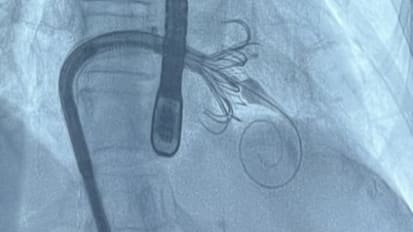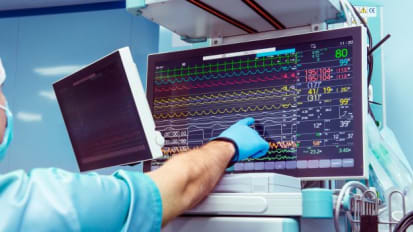Search
 News
News
High Blood Pressure Not Responding to Meds? This Might Help
UCSF Health interventional cardiologists deliver radiofrequency energy to treat overactive nerves contributing to hypertension. News
News
New Device Reduces Heart Failure Symptoms
Electrical pulses to the carotid artery help improve exercise capacity and reduce symptoms like shortness of breath and fatigue. News
News
Electronic Alerts Improve Treatment Rates of Valvular Heart Disease
A new method of alerting clinical care providers holds promise for increasing treatment and improving survival for patients with severe aortic stenosis News
News
Novel Therapy Saves Patient with Severe Heart Inflammation
A team at UC San Francisco is using a new class of drugs that target inflammation to treat acute fulminant myocarditis patients. News
News
New Study Looks at Why Cancer Treatments Cause Heart Damage
Teams from UC San Francisco and Stanford University will study why certain cancer treatments cause cardiotoxicities for some patients but not for others. News
News
International Stroke Conference Featured UCSF Experts
Stroke experts from UCSF Health presented new research and clinical findings at the annual the American Stroke Association’s International Stroke Conference (ISC25). News
News
Cardiology Conference Featured Innovations from UCSF Health Experts
Cardiology experts from UCSF Health presented new research and clinical findings at the American College of Cardiology’s (ACC) 74th Annual Scientific Session and Expo in Chicago. News
News
Medical Trainees May Be Exposed to Unnecessary Radiation Risks
Radiation from X-rays is an occupational hazard for many medical specialists, including cardiologists, vascular and orthopedic surgeons, urologists, some radiologists and gastroenterologists. Document
Document
Aortic Valve Replacement: Ross Procedure
Learn more on the Aortic Valve Replacement: Ross Procedure. News
News
Quantity of Body Fat, Rather Than Location, May Be Key for Cardiovascular Diseases
Increased obesity worldwide has become a leading cause of cardiovascular diseases. A new study by UC San Francisco and the Broad Institute of MIT and Harvard researchers found the the quantity of fat tissue rather than its location – either in the abomen or around the heart – was a greater determinant of cardiovascular disease risk. News
News
How Many People Have A-Fib? Three Times More Than We Thought
Atrial fibrillation, a rapid, irregular heartbeat that can lead to stroke or sudden death, is three times more common than previously thought, affecting nearly 5% of the population, or 10.5 million U.S. adults, according to new estimates from UC San Francisco. News
News
Aortic Valve Repair or Ross Procedure? Decision Factors in Two Patient Cases
Surgeons at the UCSF Cardiac Surgery Program specialize in aortic valve repair and replacement, options that can resolve acute symptoms and improve life expectancy. Recently, two patients with bicuspid aortic valves presented with signs of regurgitation, including shortness of breath, fatigue and chest pain. News
News
Novel Tricuspid Valve Procedure Improves Patients' Quality of Life and Health Status
UC San Francisco interventional cardiologists and interventional echocardiographers recently performed the health system’s first commercial transcatheter tricuspid valve replacement procedure using the Edwards Evoque system. News
News
How a Cardiogenic Shock Rapid Transfer Protocol Enables Lifesaving Patient Care: Case Study
UCSF has a rapid transfer protocol in place, which includes immediate access to a critical care cardiologist, expedited triage and a dedicated unit for patients transferring in for emergent care. News
News
First-of-its-Kind Amputation Prevention Center Offers Hope for the Toughest Cases
Rogelio Jacinto had five days until doctors planned to amputate his leg. It was an emotionally wrenching end to five months of unsuccessful visits to specialists to treat a diabetic foot ulcer. News
News
Physician Survey Shows Lack of Understanding of the FDA’s Approval Process
Many physicians are unfamiliar with how the Food and Drug Administration’s (FDA) regulates new drugs and medical devices, and they may be under the impression that the data supporting these approvals are more rigorous than they are, according to a national survey of physicians conducted by researchers at UC San Francisco (UCSF). News
News
Study Finds Paxlovid Treatment Does Not Reduce Risk of Long COVID
A team of researchers from UC San Francisco has found that Paxlovid (Nirmatrelvir-ritonavir) did not reduce the risk of developing long COVID for vaccinated, non-hospitalized individuals during their first COVID-19 infection. News
News
Long-term Marijuana Smoking Can Impair Blood Vessel Function
It’s been known for many years that people who smoke tobacco have poor blood vessel function. Now, a team of researchers at UC San Francisco has shown for the first that people who smoke marijuana have the same problem. News
News
Tiny, Focused Shocks Help Many Patients Overcome Heart Arrhythmia
Pulsed field ablation uses a series of tiny electrical pulses to destroy the tissue causing the arrhythmia. The procedure takes an hour or less, compared to three or four hours for conventional treatment. News
News
UCSF Health to Mark Thirty-Five Years of Heart Transplantation in 2024
In 2024, UC Health will celebrate 35 years of performing heart transplants. Since completing their first heart transplant in March 1989, UCSF surgeons have performed nearly 600, and along the way, the health system has become a recognized leader in treating heart failure and the sixth largest program for transplants in the nation. News
News
Why Do Some Long Covid Patients Continue to Have Difficulty Exercising?
While some patients recover from the effects of SARS-CoV-2 infection, others have experienced the aftereffects of COVID-19 long after the initial infection. One of these long COVID symptoms is reduced exercise capacity. News
News
Aggressive Blood Pressure Control May Prevent Common Heart Condition
Heart conduction disorders can often lead to serious or fatal complications including complete heart block or heart failure. News
News
UCSF Among First in U.S. to Receive New Surgery Designation from the American College of Surgeons
UC San Francisco Medical Center (UCSF) is among just four hospitals in the U.S. to be verified as part of the American College of Surgeons (ACS) Vascular Verification Program (Vascular-VP)... News
News
Can Artificial Intelligence Reduce Invasive Testing and Improve Cardiac Diagnostics?
Coronary heart disease is the leading cause of adult death worldwide.

